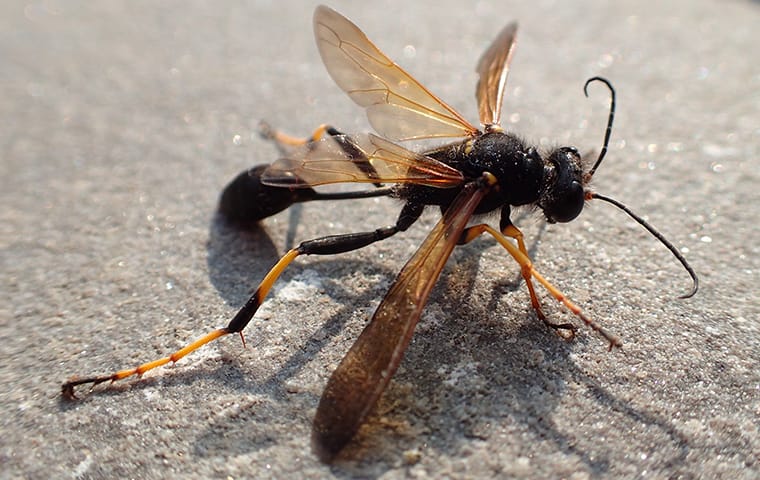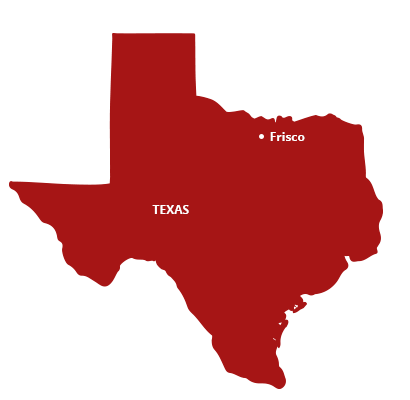What are wasps?
Wasps are a type of stinging insect. Most species of wasps are predators, killing and feeding on a variety of garden pests, cicada bugs, spiders, and other insects in order to feed their larvae. Adult wasps typically feed on nectar and play a role in some pollination, so they are considered to be beneficial to the environment when living outdoors.

Some of the most common species of wasps that live throughout our area of northeastern Texas are listed below:
Cicada killer
Cicada killer wasps are a large species of wasps. Their bodies are red and black with a yellow band around their abdomens, their heads are reddish-brown, and their wings and antennae are tinted yellow.
Ground wasps
Ground wasps are usually identified by their nests that are located in the ground. One of the most common species of ground-nesting wasps are yellow jackets. Yellow jackets have a distinctive yellow and black-striped pattern covering their abdomens.
Mud daubers
Mud daubers are a large species of wasps build their distinctive nests out of mud. They have narrow waists with a thread-like segment between their thoraxes and abdomens. Mud daubers can grow to between 1-1/2 and 2 inches long. They are black in color but some may have a metallic blue sheen.
Paper wasps
Paper wasps are large wasps that have pinched waist and six long, thin legs that dangle below their bodies when in flight. Their wings are gray and their bodies are black or brown with yellow or orange markings. Additionally, paper wasps are commonly identified by their umbrella-shaped nests.
Are wasps dangerous?
Wasps can be dangerous pests, and you should always avoid contact with them whenever possible. When agitated or threatened, wasps will defend themselves by delivering painful stings; most species of wasps have smooth stingers and are capable of stinging their victims repeatedly, injecting more venom each time. A person who is allergic to their venom may experience anaphylaxis, which can be potentially life-threatening and requires immediate medical attention.
Why do I have a wasp problem?
Wasps are attracted to Dallas homes and other properties that provide plenty of places to nest or sources of food. Most species of wasps hunt and feed on a variety of garden insects and spiders. Other popular sources of food include compost, honeydew, meats, plant nectar, and trash. Wasps living throughout northeastern Texas are most active and most aggressive in late summer and fall when they are out in large numbers foraging for food, which is the time of year you are most likely to come into contact with wasps.
Where will I find wasps?
Wasps build their nests in protected areas. Mud daubers build their small nests underneath overhangs or within tight crevices between rocks. Paper wasps place their nests up off of the ground in door frames, in trees, on utility poles, and under decks. Ground-nesting wasps often nest in the abandoned nests of small animals. Cicada killers prefer to build their nests in loose, sandy soil. While it is not common, wasps will sometimes build indoor nests and usually do so in attics, basements, chimneys, or wall voids.
How do I get rid of wasps?
The best way to eliminate wasps from your northeastern Texas property is to partner with a local pest control expert. At Addison Pest Control Of Texas, we are committed to providing each of our customers with superior pest control services to meet their individual needs. Our experienced and knowledgeable technicians always perform the most advanced, effective services. To learn more about working together to rid your home or business of wasps and other household pests, contact Addison Pest today!
How can I prevent wasps in the future?
The following tips can help you to protect your Dallas Metropolitan area home or business from becoming overrun with wasps:
-
Fill holes in your yard and remove fallen trees, tree stumps, and other debris.
-
Make sure outdoor compost bins and trash cans have tight-fitting lids.
-
Trim tree branches away from the exterior of your home or business.
-
Fix holes along the roofline and place caps on chimneys.
-
Eliminate water sources by fixing leaky pipes and fixtures.
-
Limit the number of flowering plants that are planted on your property.
-
Put weather stripping around windows and doors and replace damaged screens.
Request Your Free Inspection
Complete the form below to schedule your no obligation inspection.

